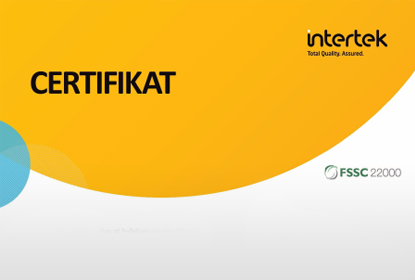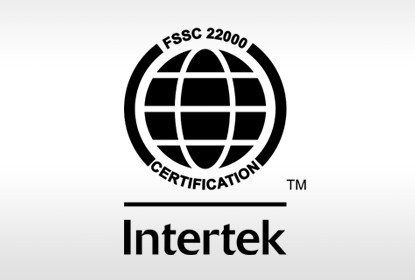FOOD AND CONSUMER SAFETY
FSSC 22000 version 4.1
Jensen’s Foods A/S is certified according to FSSC 22000 version 4.1 valid from January 3, 2019, and before that FSSC-certified since November 30, 2012.
FSSC is an international food safety standard, (Food Safety System Certification), with the purpose of securing high quality and food safety in the company and make sure our products meet the requirements for food manufacturers. FSSC is based on current ISO standards and is acknowledged by GFSI (Global Food Safety Initiative), which is a cooperation between world-leading experts in food safety in production, retail and the food manufacturing area in general.
FSSC 22000 is a very powerful and extensive addition to the own-checks programme that is the legal requirements of Danish Authorities. At Jensens Foods A/S we are aiming for the best because we think we manufacture high-quality, tasty products.
What does this certification mean to consumers?
You can feel safe and trust our products, because
- We have documented control of our food safety.
- Traceability and control are secured throughout the food chain.
The requirements for food safety are on the increase. Consumers and authorities have higher demands for the food we consume and want to make sure we provide high quality as well as high security. The latest requirements from the certified organization (FSSC) is that Jensens Foods A/S has a Food Defence policy and plan,and in addition to this a policy and plan for prevention of Food Fraud etc.
If problems arise, the source of the problem has to be found and corrected quickly. The demands are first and foremost directed towards the retailers, but from there on it spreads throughout the food chain to the manufacturing industry and the primary producers and transporters.
With FSSC 22000, the entire food chain has an increased commonstandard, which can be used across businesses and countries. A standard focusing on communication and management responsibility means maximum safety and minimal system cost.
Through a common terminology, the communication is optimised both internally in the departments of the company and externally towards customers and suppliers to minimize the risk of errors.
With a standard that takes a global perspective and provides business flexibility, the potential for efficient food safety is increased in the entire food chain.
Quality assurance includes all parties in the process from procurement, reception of goods, production and transport, even requirements to standardised conditions at the supplier in the first link. These have been mapped and risk assessed. Employees are involved daily to ensure the requirements are met.
Quality dept. Struer January 2019


